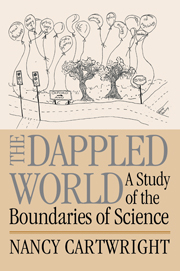Book contents
- Frontmatter
- Contents
- Acknowledgements
- Introduction
- Part I Where do laws of nature come from?
- 1 Fundamentalism versus the patchwork of laws
- 2 Fables and models
- 3 Nomological machines and the laws they produce
- Part II Laws and theier limits
- Part III The boundaries of quantum and classical physics and the territories they share
- Bibliography
- Index
2 - Fables and models
Published online by Cambridge University Press: 05 June 2012
- Frontmatter
- Contents
- Acknowledgements
- Introduction
- Part I Where do laws of nature come from?
- 1 Fundamentalism versus the patchwork of laws
- 2 Fables and models
- 3 Nomological machines and the laws they produce
- Part II Laws and theier limits
- Part III The boundaries of quantum and classical physics and the territories they share
- Bibliography
- Index
Summary
New physics, new properties
Philosophers have tended to fall into two camps concerning scientific laws: either we are realists or we are instrumentalists. Instrumentalists, as we know, see scientific theories as tools, tools for the construction of precise and accurate predictions, or of explanations, or – to get down to a far more material level – tools for constructing devices that behave in the ways we want them to, like transistors, flash light batteries, or nuclear bombs. The laws of scientific theory have the surface structure of general claims. But they do not in fact make claims about the world; they just give you clues about how to manipulate it.
The scientific realist takes the opposite position. Laws not only appear to make claims about the world; they do make claims, and the claims are, for the most part, true. What they claim should happen is what does happen. This leads realists to postulate a lot of new properties in the world. Look at Maxwell's equations. These equations are supposed to describe the electromagnetic field: B is the magnetic intensity of the field and E, the electric intensity. The equations seem to make claims about the behaviour of these field quantities relative to the behaviour of other properties. We think that the equations are true just in case the quantities all take on the right values with respect to each other.
- Type
- Chapter
- Information
- The Dappled WorldA Study of the Boundaries of Science, pp. 35 - 48Publisher: Cambridge University PressPrint publication year: 1999



